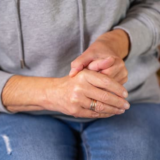Edition 6 – October 2017
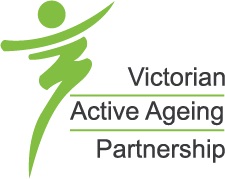
VAAP UPDATE
Key elements of transition pathways to promote sustained physical activity | Strategies to better engage ‘hard to reach’ older people | Supported pilot re: VAAP draft self-assessment tool and resources
STAKEHOLDER SPOTLIGHT
Getting in the swim with Masters Swimming Australia |LGBTI elders hit the dance floor | Lots happening in Wyndham City for older people | ‘Cycling Without Age’ is coming to Bendigo
RESEARCH UPDATE
Promoting physical activity and healthy eating in retirement villages | The dose of physical activity that reduces disability risk in older adults | Health and wellbeing strategies for ‘hard to reach’ older people
STAY IN THE KNOW
It’s never too late to be SunSmart | Whittlesea also loves walking football | Walking Football World Cup
UPCOMING EVENTS
Free community seminar – Deakin University
VAAP Update

Key elements of transition pathways to promote sustained physical activity
Well functioning assisted or transition pathways are important in assisting older people to move from one setting to another to promote and encourage their ongoing engagement in physical activity. These pathways ensure seamless service provision and that people ‘don’t fall through the cracks’. They also take the pressure off older people having to find information and physical activity opportunities themselves.
After consultation with various stakeholders, the VAAP Coordination Team has identified the key elements of transition pathways that will better ensure the sustained engagement of older people in physical activity. These elements are listed within the summary document attached here.
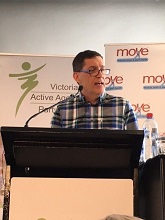
Strategies to better engage ‘hard to reach’ older people
Engagement in organised physical activity is known to impart physical, mental and social benefits to older people and to support healthy and independent ageing. Facilitators and barriers to participation across the general population of older Australians have been reported, yet there has been limited understanding of the factors affecting awareness, attendance and adherence to physical activity programs by those experiencing higher needs and social disadvantage.
A qualitative study, undertaken within the VAAP and led by Assoc Prof Ben Smith from Monash University, has gathered evidence to improve the design of physical activity programs and the capacity of activity providers to increase participation by ‘hard to reach’ groups of older people. These groups include those older people who are socioeconomically disadvantaged, living with a disability, culturally and linguistically diverse or socially isolated.
A summary of the findings of the study will be available on the VAAP webpage soon. Until then, you can view the recording of Assoc Prof Ben Smith’s presentation about the study at the VAAP 2017 Research and Practice Forum: https://drive.google.com/file/d/0B1viVQ0Qbp2hb3JWekRSN1VtWk0/view
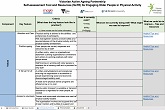
Supported pilot re: VAAP draft self-assessment tool and resources
A self-assessment tool and resources (SaTR) based on the evidence-based best practice framework for the engagement of older people in physical activity is being developed. The SaTR takes a continuous quality improvement approach and is intended as a ‘value-adding’ tool. It is not intended to rate or compare your organisation’s performance against that of another, as the results of any self-assessment review will only be known by you and your organisation.
The SaTR is designed for use by fitness/leisure centres, local councils and community health centres; other versions, specifically tailored for use by the sports industry, U3As and neighbourhood houses are also being currently developed.
If your organisation would be willing to be part of a supported pilot to test the draft of the SaTR relevant to your organisational setting (towards the end of this year or early in 2018), please contact Genevieve Nolan via genevieve@msk.org.au or 8531 8018.
Stakeholder Spotlight
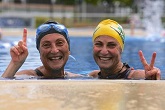
Getting in the swim with Masters Swimming Australia
Masters Swimming Australia Inc. (MSA) is the peak body for adult swimmers aged 18 years and above. It is a not-for-profit organisation and has branches and clubs across the country, including 36 clubs in Victoria.
MSA’s mission is to provide at club, state and national level an environment to encourage all adults, regardless of ability, to swim regularly and compete in order to promote fitness and improve their general well-being.
Swimming provides a safe physical activity that improves heart and lung health, improved flexibility and muscle strength as well as providing opportunities for social interaction. MSA clubs provide a supportive environment for individuals wanting to participate. There are dedicated coaches to motivate and encourage new swimmers, and community-minded club members, who are ready to welcome individuals and provide the all important social aspect.
The membership season opened on the 1 September, so it’s a good time to be promoting masters swimming. As well as providing opportunities for racing, MSA have clubs which focus on fitness and social interaction, others focus on open water swimming or do a mix of activities, making MSA clubs great places for older adults to engage.
Information about the locations etc of the Victorian clubs is available via http://www.mastersswimmingvic.org.au/Clubs/Finding-a-Club
For more information about the organisation, visit their website: http://mastersswimming.org.au/
This article was submitted to the VAAP newsletter by Lynne Sheehan, Projects Manager, Masters Swimming Australia.
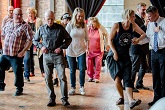
LGBTI elders hit the dance floor
The LGBTI Elders Dance Club is a creative social dance event held at the Fitzroy Town Hall on the first Thursday of each month. Lesbian, gay, bisexual, transgender and intersex elders – along with their friends and allies – are invited to attend the monthly social event, held by the artist-run group ‘All The Queen’s Men’.
All the Queens Men started the events in mid-2016 to champion the rights of LGBTI elders. Organiser, Tristan Meecham, says, ‘Our events are very casual; we start at 5.30pm with food and drinks and then we are guided by the group as to what they want to do.’ The nights usually attract 10 to 50 community members – from absolute beginner dancers to those with more skill.
David Morrison (87 years of age) has been attending the group from the beginning. He says the dance nights provide a great social opportunity for any LGBTI elders who are feeling shy. The nights are also great for keeping elders fit and active. The exciting cultural event is held monthly at the Fitzroy Town Hall and is supported by the City of Yarra.
If you or someone you know would like to join the LGBTI Elders Dance Club, please visit www.allthequeensmen.net or call Tristan on 0421 572 221.
This article was submitted to the VAAP newsletter by Frances Moloney, Coordinator Community Development and Positive Ageing, City of Yarra.

Lots happening in Wyndham City for older people
Wyndham City is committed to engaging seniors in its community life. Each year, Wyndham celebrates the Seniors Festival with a variety of events and activities to promote active participation.
Free ‘come and try’ events throughout the month of October provide residents with an opportunity to engage in physical activity that they may not otherwise consider. This year’s line-up includes archery, tennis, lawn bowls, sports activities, Tai Chi and COTA’s ‘Living Longer, Living Stronger’ program. These are run by a variety of community groups/organisations and are supported by Wyndham City.
Wyndham City also hosts a walk with up to 80 residents participating each year. This year, participating walkers will enjoy the scenic Saltwater Coast including the beautiful historic Point Cook Homestead. There are three walks of different lengths for seniors to choose from. Further details of all events for Seniors Festival can be found at: https://www.wyndham.vic.gov.au/seniorsfestival
Wyndham men are also being encouraged to put down the chicken parmigiana and put on some runners with the ‘Sons of the West’ men’s health program, now in its fourth year. The aim of the program is to improve the physical and mental wellbeing of men of all ages and abilities in the West and delivered by Wyndham City in partnership with the Western Bulldogs Football Club. In 2017, an average of 188 men participated each week with a total of 207 men graduating from this program. A great result! Building on the success of the Sons of the West Program, Wyndham City is currently piloting ‘Daughters of the West’. Similar to the Sons of the West, this program will offer women 18+ years of age a free health program. The ‘Daughters of the West’ pilot program, due to begin mid-October, is currently at capacity. Further details on these programs can be provided by contacting Wyndham City on (03) 9742 0777.
In addition, Council promotes its ongoing activities throughout the year for seniors in the ‘Wyndham Seniors Directory’. The Directory has been created to list the many and varied activities including a list of walking groups and exercise groups across the City of Wyndham. The Directory can be found at: https://www.wyndham.vic.gov.au/services/aged-disability/seniors-activity-directory
This article was submitted to the VAAP newsletter by Jenny Watts-Sampson, Disability and Positive Ageing Planner, Wyndham City Council.
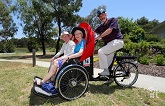
‘Cycling Without Age’ is coming to Bendigo
‘Cycling Without Age’ (CWA) is a movement started in 2012 by Ole Kassow in Denmark. Ole wanted to help the elderly get back on their bicycles, but he had to find a solution to their limited mobility. The answer was a trishaw and he started offering free bike rides to the local nursing home residents.
He then got in touch with a civil society consultant from the City of Copenhagen, Dorthe Pedersen (now CWA), who was intrigued by the idea and together they bought the first five trishaws and launched CWA, which has now spread to all corners of Denmark and since 2015 to another 33 countries around the world.
Mr Trevor Miles is now establishing a chapter of CWA in Bendigo and six young Danes are visiting Bendigo in early October to take anyone for a test ride. Trevor is a retired community member and sees cycling (via CWA) as a vehicle for community connection and promoting health. ‘Feeling the wind in their hair and being in the fresh air again takes older people back to their youth when they used to cycle’, says Trevor. People are welcome to test ride the trishaws as a passenger or as the pilot.
For further information about the activities in Bendigo or CWA more broadly, contact Trevor or check the following links:
Contact: Mr Trevor Miles – Mobile: 0417331990
News about CWA: http://www.bbc.com/news/uk-scotland-tayside-central-40728410
Website: http://cyclingwithoutage.org/
Youtube Trailer: https://www.youtube.com/watch?v=WCw87Sgrqic
Ted Talk: https://www.youtube.com/watch?v=O6Ti4qUa-OU
This item was submitted to the VAAP newsletter by Ebony Morelli, Active and Healthy Ageing Adviser, West Division Health.
Research Update

Promoting physical activity and healthy eating in retirement villages
With the ageing of the Australian population there has been growth in the number of persons aged 65 years and older who are choosing to reside in retirement villages. Those moving in to this form of accommodation are generally mobile and independent and have access to on-site recreation facilities, yet physical activity surveys have found that many have sedentary lifestyles. The opportunity to reach large groups of older people and make use of physical activity facilities that are close-at-hand, makes retirement villages potentially valuable settings for promoting active ageing. This study, conducted in Perth, Western Australia is one of few Australian initiatives to have investigated the impact of a physical activity and nutrition intervention for retirement village residents.
The study was conducted as a randomised controlled trial, with 17 intervention villages and 21 control villages. Residents aged 60–80 years of age were recruited through invitations disseminated within villages. A novel feature of the health promotion strategy was that it was delivered by trained program ambassadors, who were older people recruited from the wider community. Over six months the ambassadors met participants face-to-face on two occasions, and had subsequent contact via telephone. They used motivational interviewing techniques to support participants with setting physical activity and dietary goals, skill development, monitoring and feedback. In addition, educational resources, newsletters and resistance bands for exercise were provided.
A total of 363 older people were recruited and 280 (77.1%) completed follow-up measures after six months. Those in the intervention group showed significantly greater improvement than controls in participation in strength exercise, fruit intake and weight loss. The study demonstrated the impacts that lifestyle interventions within retirement villages can have, but it also found that half of the retirement villages contacted to participate declined. Promoting the potential benefits of programs such of this to retirement village managers should be a priority.
The complete article can be viewed at: Jancey J, Holt AM, Lee A, Kerr D, Robinson S, Tang L, Anderson AS, Hills AP, Howat P. ‘Effects of a physical activity and nutrition program in retirement villages: a cluster randomised controlled trial.’ International Journal of Behavioral Nutrition and Physical Activity 2017;14(1):92.
Available at: https://www.ncbi.nlm.nih.gov/pmc/articles/PMC5504569/

The dose of physical activity that reduces disability risk in older adults
There is a substantial body of evidence which shows that regular exercise improves physical functioning in older adults, and addresses major causes of disability such as cardiovascular disease, diabetes and falls. A question that has been understudied, however, is what level of adherence or minimal dose of physical activity is required to prevent physical disability among seniors. The Lifestyle Interventions and Independence for Elders (LIFE) Study was a large randomised controlled trial conducted across eight states in the United States, which investigated the impact of supervised physical activity upon mobility disability in older people. This article reports the findings of supplementary analysis of data collected in the LIFE study to determine the level of physical activity associated with disability outcomes.
There were 1635 persons aged 70–89 years, who were inactive and at high risk of mobility decline, recruited to the LIFE study in 2010-2011. Those allocated to the intervention arm participated in physical activity classes twice per week that included walking, resistance, flexibility, and balance exercise, and were provided with additional home-based physical activity recommendations. Participants in the control arm of the study were invited to attend health education workshops on ‘successful ageing’. The average duration of follow-up of participants was 2.6 years.
The LIFE study found that the structured physical activity program reduced major mobility disability by 18% and persistent mobility disability by 28%, compared with the health education program. A major finding was that in the physical activity arm of the study there was a dose-response relationship between level of physical activity and reduction in the major mobility disability over 24 months. Small increases in physical activity of 48 minutes per week or more, or approximately one LIFE study physical activity session, lead to significant and clinically meaningful effects in disability.
The full report of this study is provided at: Fielding RA, Guralnik JM, King AC, Pahor M, McDermott MM, Tudor-Locke C, Manini TM, Glynn NW, Marsh AP, Axtell RS, Hsu FC. ‘Dose of physical activity, physical functioning and disability risk in mobility-limited older adults: Results from the LIFE study randomized trial.’ PloS one 2017;12(8):e0182155.
Available at: https://www.ncbi.nlm.nih.gov/pmc/articles/PMC5562326/

Health and well-being strategies for ‘hard to reach’ older people
Facilitating engagement of socially disadvantaged and isolated older people in physical activity programs is a priority in Victoria. Identifying effective methods of contacting and supporting ‘hard to reach’ older people is also a concern for other health and community services. It is recognised that this requires an understanding of the social determinants of health and a preparedness to act a number of levels (e.g. interpersonal, organisational, economic) to reduce barriers to participation. The review reported in this article investigated the policies and actions that have been put in place by local councils and health services in England to engage with ‘hard to reach’ older people and address their needs.
The study was conducted as a document review of strategies and related reports, dated between 2009 and 2015, adopted by local councils, public health organisations and clinical agencies within 10 high needs localities. These localities were selected on the basis of their high concentrations of persons aged 85 years and over, ethnic minority groups, and people experiencing fuel poverty or receiving pension credits. A mix of city, urban and rural areas was included.
There were 254 documents that were retrieved and reviewed. Strategies to address deprivation included winter fuel payments, income support, debt reduction and social inclusion initiatives. In rural areas a strategy used was recruitment of village ‘agents’ to address the deprivation experienced by selected older people. The needs of those classified as the ‘oldest old’ were met by integration of different services for older people, community alarm services, and provision of dietary advice. For black and minority ethnic groups, there was evidence of housing initiatives and monitoring of service access. While the review did not evaluate the effectiveness of strategies for engaging ‘hard to reach’ older people, it provided a valuable snapshot of the different ways that local councils and health agencies were attempting to meet the needs of these groups.
The full article can be found at: Iliffe S, Walters K, Manthorpe J, Goodman C, Kharicha K. ‘Health and well-being promotion strategies for “hard to reach” older people in England: a mapping exercise.’ Primary Health Care Research and Development. 2017; Jul:1-11. [ePub ahead of print]. Access to the article may depend on your institutional rights.
Stay in the know
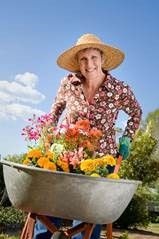
It’s never too late to be SunSmart
With warmer weather approaching, your older clients may want to spend more time outdoors. This can be a good opportunity to help them find ways to participate in external physical activity and help them to stay active during the warmer months.
Encouraging older people to take necessary and appropriate precautions when exercising has become a routine part of the physical activity programs in which they commonly engage. One such appropriate precaution for any person when being physically active outdoors, is to protect themselves from the sun.
As temperatures increase during the Spring and Summer months, so too does the sun’s level of ultraviolet (UV) radiation. The sun’s UV rays are strong enough to cause sunburn, eye damage and skin damage, which can ultimately lead to skin cancer.
The good news is, with the right gear, your older clients can reduce their risk of skin damage and skin cancer. Here are some helpful tips to share with your older clients:
- Use the daily sun protection times to find out when you do and don’t need to protect your skin. You can check your local times on the free ‘SunSmart’ app on the Bureau of Meteorology website (bom.gov.au) or at www.sunsmart.com.au Schedule your outdoor activities either side of these times – in the morning or afternoon – to avoid peak UV levels.
- Slip on covering clothing
Look for long-sleeved and collared tops, as well as long pants that cover as much skin as possible. - Slop on sunscreen
Choose a sunscreen that’s SPF30 or higher, broad-spectrum and water-resistant. Apply it 20 minutes before you go outdoors and re-apply it every two hours. - Slap on a hat
Most people grab a baseball cap, but these will only shade your forehead, at best. To protect your face, nose, neck, ears and eyes, go for a broad-brimmed, legionnaires or bucket-style hat. - Seek out shade
Get active in a local park or garden that has plenty of trees or find a shady spot for your outdoor workout. - Slide on sunnies
Check the swing tag when you’re buying a new pair of sunglasses to make sure they meet the Australian Standard for sun protection (AS/NZS1067) and consider a close-fitting, wrap-around style that will protect eyes best.
For more information and resources visit www.sunsmart.com.au or contact SunSmart on 03 9514 6419 or sunsmart@cancervic.org.au.
This item was submitted to the VAAP newsletter by Caoimhe Geraghty, SunSmart Workplaces and Communities Coordinator, Cancer Council Victoria.
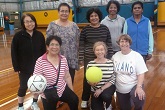
Whittlesea also loves walking football
The Whittlesea U3A Walking Football Program was started by community partners City in the Community (Melbourne City Football Club), Whittlesea U3A, City of Whittlesea’s Positive Ageing Team and the Multicultural Social Group of Victoria.
The program enables people over 50, men and women of all abilities to play football (soccer) using modified rules and equipment which allow easy participation. The rules of play promote walking (no running), keeping the ball low and no contact. The program is held at the Mill Park Basketball Stadium, every Thursday during school terms 10am-12pm.
Volunteer coaches organise a range of fun, social activities including warm-up exercises, soccer drills and skills and mini games. Up to 30 participants attend every week with the average age being 70 years.
The program has attracted participants from a range of countries of origin including Greece, Italy, Former Republic of Macedonia, China, Sri Lanka, Philippines and Ireland.
This item was submitted to the VAAP newsletter by Con Constantinou, Seniors Citizens Community Development Officer, City of Whittlesea
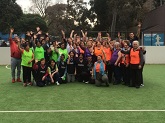
Walking Football World Cup
Whittlesea U3A is also involved in the inaugural Walking Football Seniors World Cup which will be held as part of the Victorian Seniors Festival
on Thursday 12 October 2017.
People of all abilities aged over 50 are welcome to come along or form a team to play in the social competition. Men’s and women’s teams
are welcome.
There will be a colourful opening ceremony, a warm-up exercise class led by a local physiotherapist, ‘come and try’ soccer clinics, a social
competition and BBQ lunch.
Further details are as follow:
Date: Thursday 12 October 2017
Time: 10am – 3pm Venue: Mill Park Basketball and Netball Stadium, Redleap Avenue, Mill Park
Cost: $5 per person (includes morning tea and lunch)
Inquiries and bookings: 9407 5913 or 0404 119 189
What to bring: Runners or indoor soccer shoes (no black soles)
This item was submitted to the VAAP newsletter by Con Constantinou, Seniors Citizens Community Development Officer , City of Whittlesea
Upcoming Events
![]()
Free community seminar – Deakin University
A free public seminar is being hosted by the Institute for Physical Activity and Nutrition, Deakin University.
Key questions to be covered in the presentations are:
- Is diet and exercise enough to boost brain health and maintain bone density?
- Is there a single approach that works to improve both mind and mobility?
This event has already taken place.








